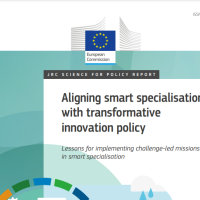
The new perspective on the Czech Republic's innovation policy and key guidelines for achieving greater sustainability. The Ministry of Industry and Trade and the Joint Research Centre (JRC) of the European Commission have produced a study "Aligning smart specialisation with transformative innovation policy".
The study focuses on how new tools, called missions, can be integrated into smart specialisation strategies. The aim is to address societal challenges and contribute to the Sustainable Development Goals. It was developed in close cooperation with the Ministry of Industry and Trade (MIT) and other experts in innovation policy. It summarises the relevant areas for the implementation of the missions, from the design and identification of topics through implementation to monitoring and evaluation. Countries and regions in Europe are increasingly focusing on global societal challenges and their solutions, reflecting the adoption of internationally valid strategies such as the European Green Deal (EGD) and the UN 2030 Agenda defining the Sustainable Development Goals (SDGs).
In 2018, the European Commission's Joint Research Centre started work on developing a new societal challenge-oriented approach and finding ways to integrate it into Smart Specialisation Strategies (S3). This resulted in an international research project involving the Czech Republic. The aim was to find ways to implement the UN's STI4SDG Roadmap activity, which recommends that countries and regions develop their own "roadmap" for using science, technology and innovation to achieve the SDGs.
A mission-oriented research and innovation policy has already become one of the elements of the Czech Republic's S3 strategy. The national RIS3 team at the MIT has already prepared two missions that have already been finding their place in public calls and public tenders. "Preparing the methodology for developing missions is a challenging discipline that requires the involvement of domestic and foreign experts," says Petr Očko, Senior Director of the Digitisation and Innovation Section of MIT, adding: "This framework study provides us with a valuable theoretical basis for the mission development methodology, which will also be one of the outputs of the project Systemic Support for Implementation and Management of the National RIS3 Strategy 2023+. The joint work of experts from the JRC and its addressed collaborators, members of the MIT National RIS3 team and other involved experts from the national and regional level provides us with a comprehensive knowledge on the incorporation of sustainability issues into the S3 Strategy, and outlines concrete measures and procedures to support the implementation of missions, including the establishment of a monitoring and evaluation system."
The study is divided into 7 chapters:
- Smart specialisation focusing on societal challenges for the SDGs
- Framework for societal challenge-oriented missions
- Toolkit for S3 missions
- Procedures to support the implementation of S3 missions
- Monitoring and evaluation of S3 missions
- Links for developing a framework for S3 mission planning
- Conclusions and recommendations
In addition to this study, which summarizes the guiding principles for the development of S3 missions, the national RIS3 team has also obtained specific recommendations for the Czech Republic that take into account the innovation policy situation in our context. Specifically, the JRC team recommends the following key actions:
To set up an appropriate mechanism for communication between ministries or managing authorities. This means moving from programme-based support to a portfolio approach.
To Have sufficient human resources to design and especially to coordinate the implementation of missions.
To Change the mentality on the part of providers and as well as applicants from supporting selected technological solutions to a more comprehensive "mission-oriented approach".
These are the very recommendations that the Department will reflect in the mission development methodology and emphasise when communicating with relevant RDI stakeholders.
